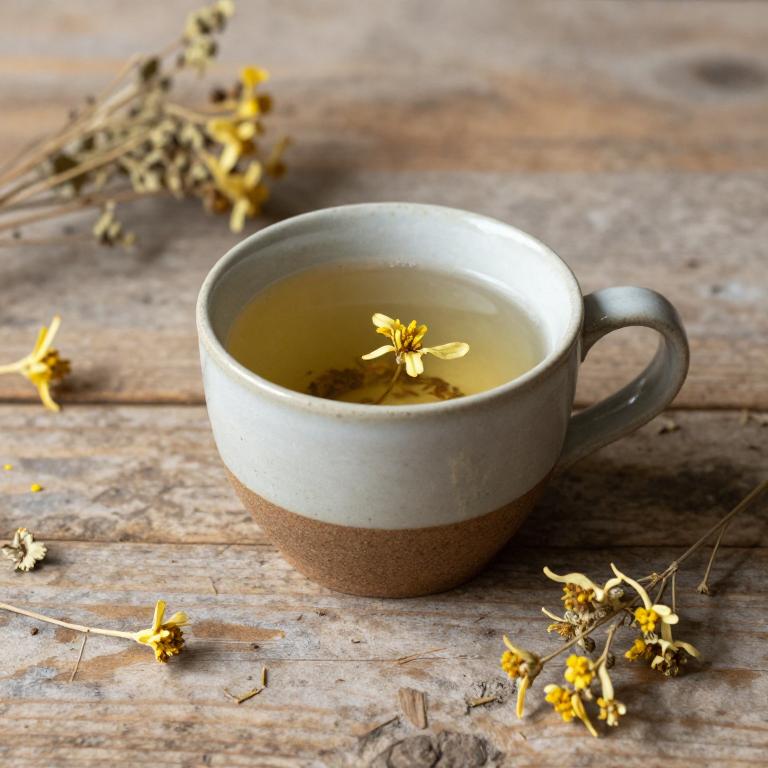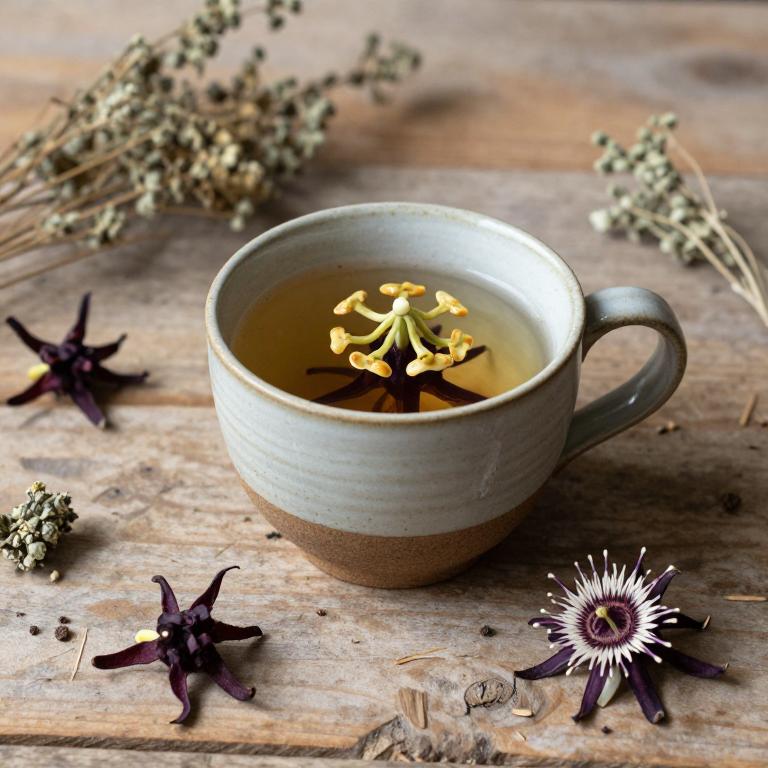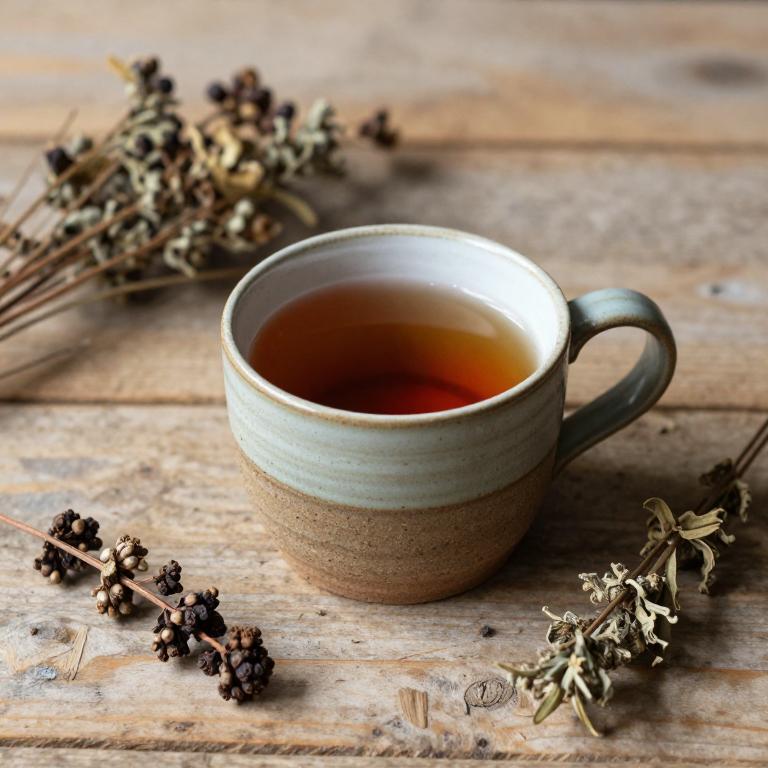10 Best Herbal Teas For Insomnia

Herbal teas are a natural and soothing alternative for individuals suffering from insomnia, offering a calming effect without the stimulating side effects of caffeine.
Common ingredients such as chamomile, valerian root, and lemon balm are known for their ability to promote relaxation and improve sleep quality. These teas work by gently calming the nervous system and reducing anxiety, which are common contributors to sleeplessness. Drinking a cup of herbal tea in the evening can help signal the body that it's time to wind down and prepare for rest.
While they are generally safe, it's advisable to consult a healthcare provider if insomnia persists, as it may indicate an underlying health issue.
Table of Contents
- 1. Valerian (Valeriana officinalis)
- 2. Maypop (Passiflora incarnata)
- 3. Chamomile (Matricaria chamomilla)
- 4. Camellia (Camellia sinensis)
- 5. Licorice (Glycyrrhiza glabra)
- 6. Sweet almond (Prunus dulcis)
- 7. Ginger (Zingiber officinale)
- 8. Kava (Piper methysticum)
- 9. Salvia (Salvia officinalis)
- 10. European lime (Tilia europaea)
1. Valerian (Valeriana officinalis)

Valeriana officinalis, commonly known as valerian, is a herbal remedy traditionally used to promote relaxation and improve sleep quality.
Its sedative properties are believed to be due to the presence of compounds like valerenic acid and essential oils that may interact with the central nervous system. Valerian tea is often recommended for individuals suffering from insomnia or other sleep disorders, as it may help reduce the time it takes to fall asleep and enhance overall sleep duration. However, it is important to consult with a healthcare professional before use, especially for those taking medications or with existing health conditions.
While some studies suggest valerian may be effective, more research is needed to fully understand its mechanisms and long-term effects.
2. Maypop (Passiflora incarnata)

Passiflora incarnata, commonly known as passionflower, is a herbal remedy often used to help alleviate insomnia due to its calming and sedative properties.
This plant contains compounds such as flavonoids and alkaloids that may help reduce anxiety and promote relaxation, making it beneficial for those struggling with sleeplessness. Passionflower herbal teas are typically prepared by steeping dried leaves or flowers in hot water, and they are often consumed in the evening to encourage better sleep. Studies suggest that regular consumption of passionflower tea may improve sleep quality and duration, though more research is needed to fully understand its long-term effects.
As a natural alternative to pharmaceutical sleep aids, passionflower tea offers a gentle and soothing option for those seeking to improve their rest without relying on medication.
3. Chamomile (Matricaria chamomilla)

Matricaria chamomilla, commonly known as chamomile, is a popular herbal tea used to address insomnia due to its calming properties.
The tea contains compounds like apigenin, which bind to certain receptors in the brain that may reduce anxiety and promote relaxation. Chamomile tea is often consumed before bedtime to help ease the transition into sleep and improve sleep quality. Its mild, floral taste makes it a soothing and accessible option for those seeking natural remedies for sleep issues.
While generally safe, it is advisable to consult a healthcare provider before use, especially for individuals taking medications or with existing health conditions.
4. Camellia (Camellia sinensis)

Camellia sinensis, the plant from which green, black, and white teas are derived, contains compounds like caffeine and L-theanine that can influence sleep patterns.
While caffeine in Camellia sinensis tea can act as a stimulant and may exacerbate insomnia, some herbal teas made from this plant, such as white tea, contain lower caffeine levels and may be gentler on the nervous system. Certain varieties of Camellia sinensis tea, when consumed in moderation, might promote relaxation due to the presence of amino acids and antioxidants. However, it is important to note that the stimulating effects of caffeine can interfere with sleep, making it unsuitable for individuals with insomnia.
For those seeking herbal teas to aid sleep, it is generally recommended to opt for caffeine-free alternatives or consult a healthcare professional for personalized advice.
5. Licorice (Glycyrrhiza glabra)

Glycyrrhiza glabra, commonly known as licorice root, has been traditionally used in herbal teas to help alleviate symptoms of insomnia due to its mild calming effects on the nervous system.
The tea contains compounds like glycyrrhizin and flavonoids, which may contribute to its soothing properties by reducing stress and promoting relaxation. While it is not a cure for insomnia, licorice root tea can serve as a complementary remedy to support better sleep when consumed in moderation. However, excessive consumption may lead to side effects such as increased blood pressure, so it is advisable to consult a healthcare professional before regular use.
Overall, licorice root tea offers a natural, soothing option for those seeking herbal support for sleep-related issues.
6. Sweet almond (Prunus dulcis)

Prunus dulcis, commonly known as the sweet almond tree, is not typically used as a herbal tea for insomnia, as its primary use is in culinary and cosmetic applications.
However, some herbal formulations may incorporate parts of the Prunus dulcis plant, such as its leaves or flowers, which are believed to have mild calming properties. These parts contain compounds like flavonoids and phenolic acids that may support relaxation and reduce anxiety, potentially aiding in sleep. While there is limited scientific evidence specifically linking Prunus dulcis to insomnia treatment, it is sometimes used in traditional medicine for its soothing effects.
For individuals seeking natural remedies for sleep issues, it is advisable to consult with a healthcare professional to explore safe and effective options.
7. Ginger (Zingiber officinale)

Zingiber officinale, commonly known as ginger, is often used in herbal teas to help alleviate insomnia due to its calming and soothing properties.
The active compounds in ginger, such as gingerol and shogaol, may help reduce anxiety and promote relaxation, making it beneficial for individuals struggling with sleep disturbances. While ginger tea is generally safe for most people, it is important to note that it may have a mild stimulating effect on some individuals, potentially interfering with sleep. To maximize its benefits for insomnia, it is recommended to consume ginger tea in the evening, but not too close to bedtime.
As with any herbal remedy, it is advisable to consult a healthcare provider before incorporating ginger into a sleep regimen, especially for those with existing health conditions or taking medications.
8. Kava (Piper methysticum)

Piper methysticum, commonly known as kava, has been traditionally used in the Pacific Islands for its calming effects and is increasingly being explored as a natural remedy for insomnia.
The herb contains compounds called kavalactones, which may help reduce anxiety and promote relaxation, making it a potential aid for those struggling with sleep disturbances. When prepared as a herbal tea, kava can be consumed in the evening to help ease the transition into sleep, though it should be used with caution due to its sedative properties. However, it is important to note that kava may interact with certain medications and should not be consumed in excessive amounts to avoid side effects.
As with any herbal remedy, it is advisable to consult a healthcare professional before incorporating kava into a sleep regimen.
9. Salvia (Salvia officinalis)

Salvia officinalis, commonly known as sage, is a popular herb used in herbal teas to help alleviate symptoms of insomnia.
This plant contains compounds such as flavonoids and rosmarinic acid, which are believed to have calming effects on the nervous system. Sage tea is often consumed in the evening to promote relaxation and improve sleep quality. Its mild, earthy flavor makes it a pleasant and soothing option for those seeking natural remedies for sleep issues.
While more research is needed, many people find that regular consumption of sage tea can contribute to better rest and overall well-being.
10. European lime (Tilia europaea)

Tilia europaea, commonly known as the European linden tree, has been traditionally used for its calming properties, making it a popular ingredient in herbal teas for insomnia.
The flowers of the linden tree are harvested and dried to create a soothing infusion that is believed to promote relaxation and ease sleep difficulties. This herbal tea is often consumed in the evening to help reduce anxiety and encourage a restful night's sleep. It is valued for its mild, sweet aroma and its ability to gently calm the nervous system.
While generally safe, individuals with allergies to related plants should exercise caution when using linden tea.